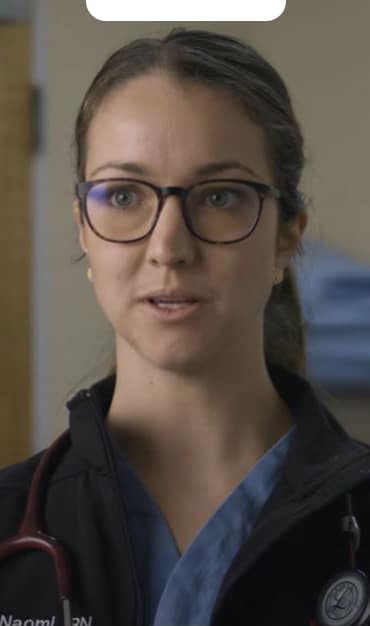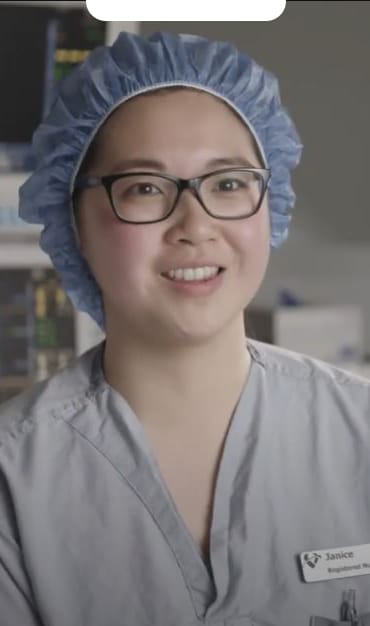Get sponsored to become a specialized nurse
Fraser Health offers Specialty Nursing Education Sponsorship to selected applicants as part of our ongoing shared responsibility for professional development and safe, competent ethical care.
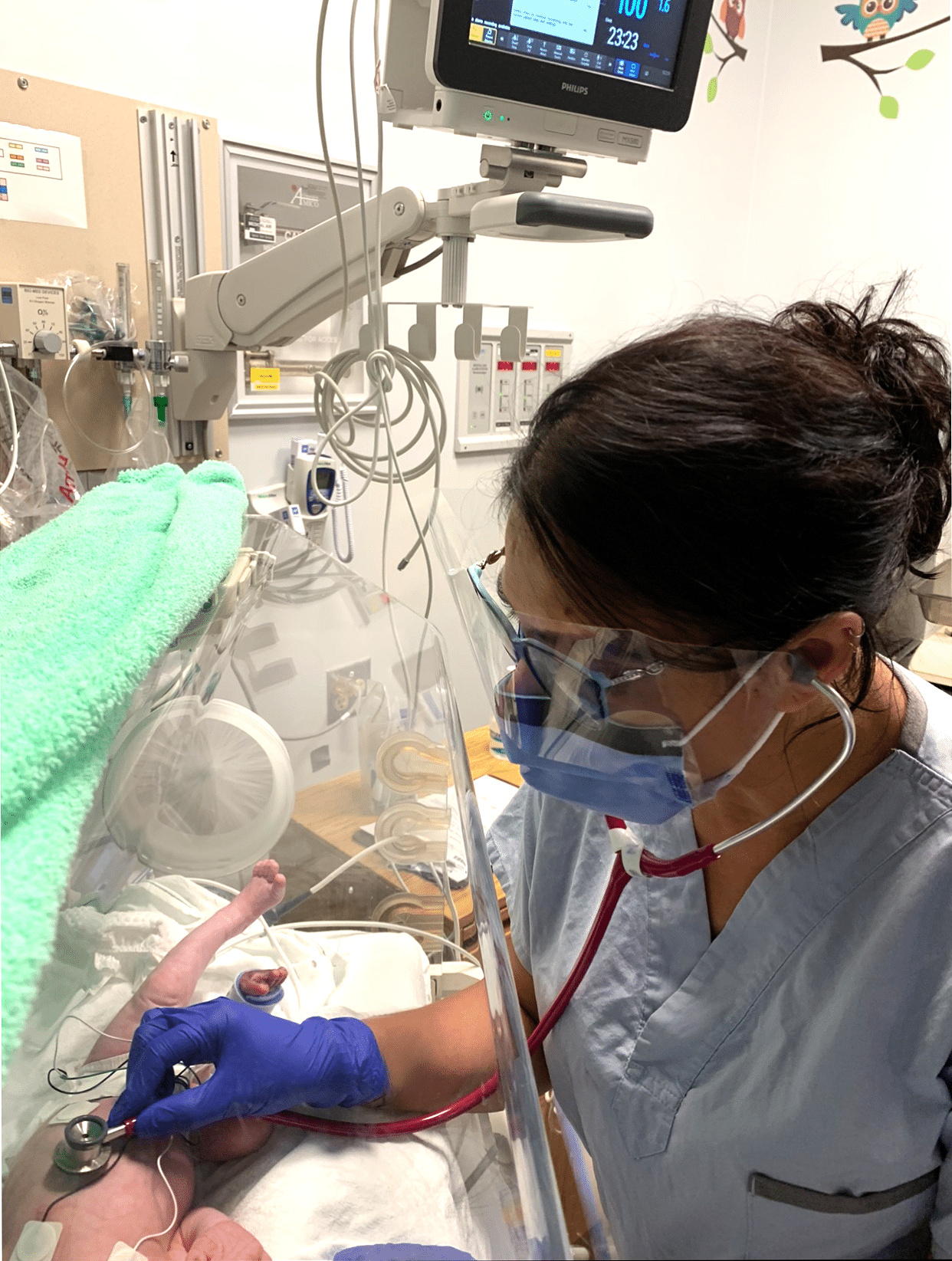
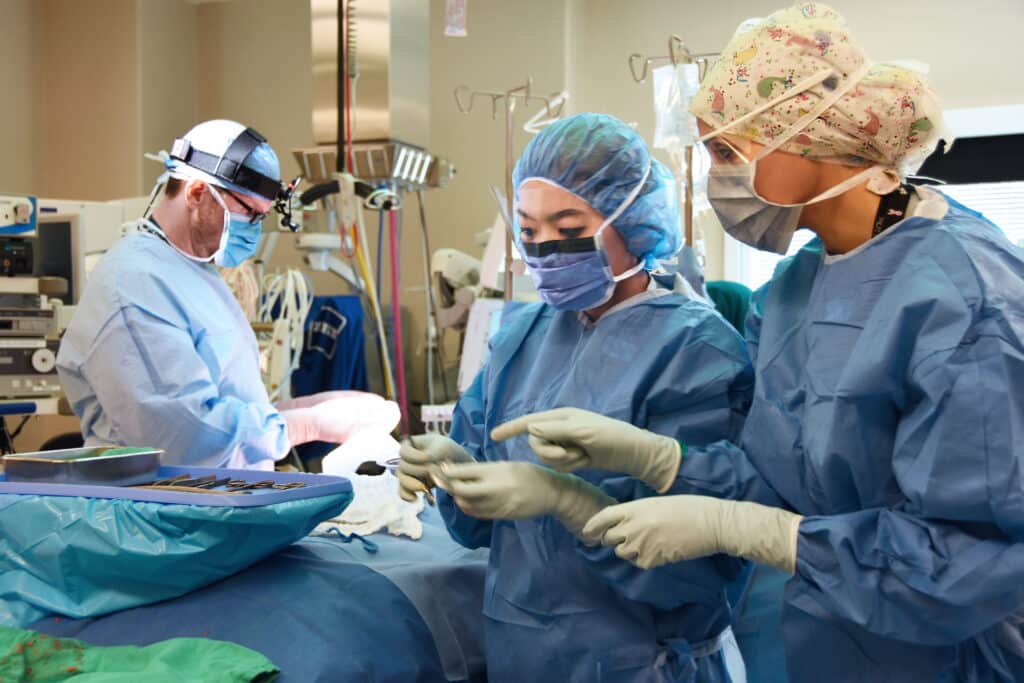
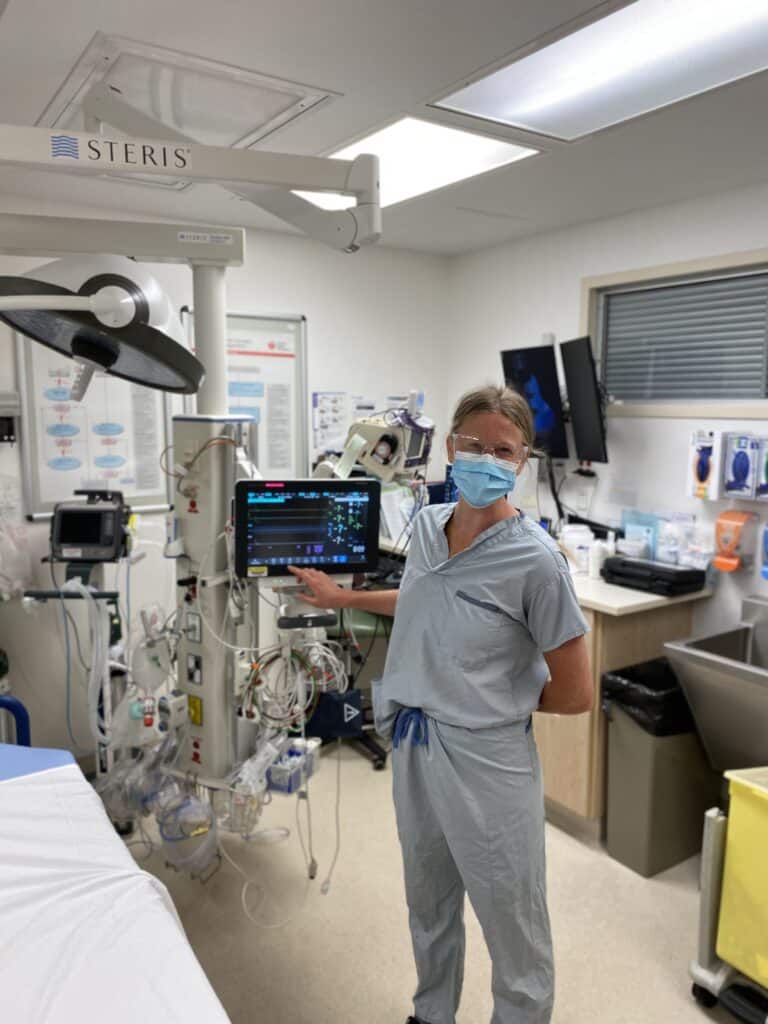
We'll pay 100% of your tuition and your wages.
Upon successful completion of the program, employees are offered a regular position within the specialty they have chosen.
- Please note an 18-month Return-of-Service commitment may be required upon successful completion of a program.
Specialty sponsorship is currently available in the following programs:
Fraser Health offers two educational programs to achieve your critical care certificate. The outcome for both programs is novice critical care competencies suitable for safe, independent practice in the Intensive Care Unit (ICU).
Fraser Health Return of Service Agreement required: YES
Pre-requisite: Mosby’s four-week dysrhythmia interpretation and management program
Fraser Health Critical Care Program (CCP)
The Fraser Health Critical Care Program (CCP) is a 13.5-week condensed, competency-based program. Our clinicals are instructor- led, held at Abbotsford Regional Hospital (ARH), Surrey Memorial Hospital (SMH) and Royal Columbian Hospital (RCH). Learners will be placed at the site they are going to, or the closest training site to their home hospital.
CCP clinical shifts are 12 hours to align with training site shifts, and all shift differentials are paid as per British Columbia Nurses Union (BCNU) contract. At the end of the program, learners are deemed Critical Care Qualified and their return of service agreement begins.
Using the blended curriculum, CCP guides learners through multiple platforms of education, featuring virtual modalities, high fidelity simulation, instructor-led clinical experiences and a robust guest lecturer series. Emphasis is placed on early socialization to the clinical environment and post graduation transition support.
CCP curriculum consists of the Essentials of Critical Care Orientation (ECCO) online modules, online synchronized sessions, clinical experience and simulation labs. Learners who are destined for the Cardiac Surgery Intensive Care Unit (CSICU) will also receive theory and instructor led education to give them a solid foundation in CSICU theory and practice.
*Learners coming with a previous program specialty certificate including either Rural Emergency Competency Education Pathway (ECEP), High Acuity Unit (HAU) or Advanced Cardiac Education (ACE) trained, can complete a bridging program that is an eight-week CCP course.
| Prerequisite Phase | Full Time Component |
|---|---|
| November or December | January to April |
| July or August | September to December |
*Can join any available ECG course prior to FTS *Bridge starts same months for 8 weeks total.
BCIT Critical Care Nursing Program
BCIT offers a 37-week Critical Care Nursing Program (24 weeks online and 13 weeks full time studies). The clinical component occurs at a regional tertiary level ICU following an instructor-led model.
Prerequisite Phase
Comprised of two courses that will be completed while the learner continues to work at their home site:
- NSCC 7150 – Dysrhythmia Interpretation and Management (Online prerequisite)
- NSCC 7120 – Critical Care Theory 1 (Online prerequisite)
Clinical Full Time Component
During this portion of the program, the learner is released from their position and attends education full time. Classroom sessions are held in person at the BCIT campus as well as virtual learning. At the end of the program, learners are deemed Critical Care Qualified and their return of service agreement begins.
- NSCC 7320 – Critical Care Theory 3
- NSCC 7420 – Clinical 1
- NSCC 7520 – Critical Care Theory 4
- NSCC 7620 – Clinical 2
*Note: A bridge in option is available to those who have previously completed BCIT Emergency or High Acuity Specialty Programs.
| Prerequisite Phase | Full Time Component |
|---|---|
| June to December | January to March |
| September to March | March to June |
| January to June | July to September |
| March to December | September to December |
Fraser Health offers two streams into sponsored education programs for registered nurses (RN) wishing to pursue a career in the Post Anesthesia Care Unit (PACU): the Fraser Health Critical Care Program or the BCIT Critical Care program which are both followed by the Fraser Health Post Anesthetic Care Unit Education Program (PEP).
PEP is a three-week program that directly follows the Fraser Health Critical Care Program or the BCIT Critical Care Program. Once sponsorship for PACU is approved, the learner will automatically be registered into the pre-requisite courses and PEP course.
Team leads from cardiac, critical care and PACU education programs will provide course information. PEP can also be offered by itself for those who have been hired into a PACU vacancy with previous critical care certification/experience.
The program schedule is like a traditional school schedule, Monday to Friday with statutory holidays off. The blended learning curriculum combines foundational PACU theory with hands-on simulation training, Virtual learning, online modules, and clinical practice. This program equips RNs with the knowledge and skills necessary to provide exceptional care throughout the perianesthesia phases and surgical journey in the PACU setting.
Pre-Requisites to PEP
Critical Care certificate which includes dysrhythmia education, most commonly:
- Fraser Health’s Critical Care Program (CCP) (attach link)
- BCIT’s Critical Care Nursing Program
Return of Service Agreement: Required when PEP streaming with a Critical Care Program
PACU Education Program
- Online theory (52.5 hours): Includes MOPAN online course: Mosby’s Orientation to Perianesthesia Nursing. Synchronous online sessions with PEP CNE include lectures and discussion that bridges theory to practice in Fraser Health.
- Simulations (15 hours): PACU simulation scenarios provide hands-on experience and debriefing of core concepts.
- Clinical (45 hours): Preceptor led clinical shifts with support from PEP CNE at learner’s hiring site. Learners will develop nursing assessments and skills related to the PACU.
Fraser Health Critical Care Program dates
| Prerequisite Phase | Full Time Component |
|---|---|
| November or December | January to April |
| February or March | April to July |
| July or August | September to December |
| *Can join any available ECG course prior to FTS | *Bridge starts same months for 8 weeks total |
BCIT Critical Care Program dates
| Prerequisite Phase | Full Time Component |
|---|---|
| June to December | January to March |
| September to March | March to June |
| January to June | July to September |
| March to December | September to December |
Upon successful completion of the program, students will receive a certificate of completion for the Fraser Health PACU Education Program. Learners will leave the program with knowledge and skills to perform as a PACU RN at the novice level with support. PEP will be followed by unit orientation which will vary depending on site acuity and surgical specialties. PEP is available at the following Fraser Health sites:
- Abbotsford Regional Hospital
- Burnaby Hospital
- Chilliwack General Hospital
- Delta Hospital
- Eagle Ridge Hospital
- Jim Pattison Outpatient Care and Surgery Center
- Langley Memorial Hospital
- Peace Arch Hospital
- Ridge Meadows Hospital
- Royal Columbian Hospital
- Surrey Memorial Hospital
The Regional Endoscopy Program (REP) is a six-week full-time program for registered and licensed practical nurses who have been hired to areas where they will have roles and responsibilities in GI endoscopy in an ambulatory care setting.
Regional Endoscopy Program
- Online theory (80 hours): Includes Association of Perioperative Registered Nurses (AORN) course: Foundations of Endoscopy, Skillstat: Safe and Effective Procedural Sedation and Analgesia and several LearningHub courses. Daily synchronous online sessions with Regional Endoscopy Program (REP) Clinical Nurse Educator (CNE) are included for discussion of online theory.
- Skillslab (40 hours): Includes equipment management, guest speakers, hands-on interaction with equipment and discussion on GI emergencies
- Clinical (120 hours): Mentor led with support from REP CNE at learners hiring site. Learners are able to develop nursing assessments and skills related to a GI endoscopy setting.
Intakes
| Registration Deadline | Full Time Component |
|---|---|
| September | November to December |
| December | February to March |
| March | May to June |
| July | August to Oct |
Upon successful completion of the program, students will receive a certificate of completion for the Fraser Health Regional Endoscopy Program. Learners will leave the program with knowledge and skills to perform as a GI endoscopy nurse at a novice level.
Fraser Health offers two streams of sponsored education programs for registered nurses (RN) wishing to pursue a career in emergency (ER) nursing. Graduates of both programs are prepared with the practical and theoretical knowledge for entry-level practice in an acute emergency nursing environment.
Fraser Health Return of Service Agreement required: YES
BCIT Emergency Nursing Program
BCIT’s Emergency Nursing Program provides learners with virtual, in person and hands on experience to prepare learners to receive their Advanced Certificate in Emergency Nursing. The clinical portion of the experience is an instructor-led model at a variety of both Fraser Health and Vancouver Coastal Health sites. The program schedule is like a traditional school schedule, Monday – Friday with statutory holidays off. Clinical portions may occur during the day or in the evening. The program is broken down into two components:
Prerequisite Phase:
Comprised of two courses that will be completed while the learner continues to work at their home site.
- 7150 is the dysrhythmia course that is completed in person over a four-day period
- 7110 is the first online theory course. This is completed as distance education with online instructor support
Clinical Full Time Component:
During this portion of the program, the learner is released from their position and attends education full-time. Classroom sessions are held in person at the BCIT campus as well as virtual learning. At the end of the program, learners are deemed Emergency Qualified and their return of service agreement begins.
- 7210 & 7300 (Theory/Clinical) completed simultaneously over seven weeks
- 7410 & 7500 (Theory/Clinical) completed simultaneously over five weeks
- ACLS Certificate
| Prerequisite Phase | Full Time Component |
|---|---|
| May – August | September – December |
| August – November | January – April |
| December – March | April – June |
Emergency Competency Education Pathway (ECEP) Program
Fraser Health’s in-house emergency nursing program is a multiphase advanced training program that trains nurses through a blended approach utilizing theory, simulation and clinical experiences. The clinical portion of the program is preceptor-led at the learner’s home site allowing the learner to be fully immersed in their home environment. Outside of the theory and simulation, preceptor shifts follow a traditional shift worker schedule comprising of days, nights and weekends.
ECEP Phase One
A 12-week program that includes theory, simulation and practical experience. The learner is released from their schedule at the start of the program. At the end of the program, the learner is deemed Emergency Qualified with some limitation in scope allowing them to provide care to most patients presenting to the emergency department excluding trauma and triage. The 18-month return of service agreement begins after phase one.
- Online theory modules are released six weeks prior to the course start for learners to complete on their own time
- SkillStat is the three-day dysrhythmia course that is completed during the first week of the program
- Theory (138 hours), Simulation and Skills (52 hours), Clinical practice via preceptorship (260 hours)
- Preceptorship is supported by regular clinical nurse educator visits every two to four shifts
- Advanced Cardiovascular Life Support (ACLS) and Pediatric Emergency Assessment, Recognition and Stabilization (PEARS) certificate
ECEP Phase Two
After phase one, learners can expect to consolidate their knowledge and skills over approximately 500 hours. Once consolidation has occurred and the learner is demonstrating readiness, the learner will enter phase two which is a four-week program that focuses on gaining the knowledge and experience to provide primary care to trauma and resuscitation patients as well as the leadership skills to support this work.
- Online theory modules are released six weeks prior to course start
- Two weeks of theory and simulation
- 67 hours of clinical experience at a combination of home sites and trauma centers within Fraser Health
- Pediatric Advanced Life Support (PALS) certificate
| Phase One | Phase Two |
|---|---|
| October – December | September |
| February – April | January |
| May – August | May |
Courses and Training
Mosby’s ECG 4.0 Dysrhythmia Interpretation and Management Program
The Fraser Health Dysrhythmia Interpretation and Management Program commonly referred to as Mosby’s ECG 4.0 is an approximately five-week primarily self-paced online program for registered nurses who have been hired to areas where they will be responsible for caring for patients on telemetry.
Pre-requisite: RN status and employment with Fraser Health
Program details
- Online (28 hours):Includes 17 accredited content modules and a practice final exam.
- Exam prep session (two (2) hours): Optional attendance. Session helps to narrow down focus of study for the final exam.
- Final exam (two (2) hours):In-person exam with a minimum passing score of 80%. Learners get two attempts to write the exam and obtain the passing score.
- Classroom Education Day (7.5 hours): In person (8:00 a.m. to 4:00 p.m.). Focused on:
- Practicing dysrhythmia interpretation
- Identifying dysrhythmia impact to cardiac output
- Understanding patient assessments for dysrhythmias
- Recognizing treatments for dysrhythmias
- Simulation day (7.5 hours): In person (8:00 a.m. to 4:00 p.m.). Focused on:
- Practicing dysrhythmia interpretation in real time
- Recognizing deteriorating patients with high fidelity simulation mannequins
- Understanding the roles and responsibilities of a tele nurse
- Escalating care for deteriorating patients
- Understanding appropriate treatments for dysrhythmias and what is within tele nurse scope.
Intakes: Offered six (6) times per year
Upon successful completion of the program, students will receive a certificate of completion for the Fraser Health Dysrhythmia Interpretation and Management course. Learners will leave the program with knowledge and skills to perform as telemetry nurses at a novice level.
Core Learning in Critical Care (CLCC)
Core Learning in Critical Care (CLCC) is a three (3) week, full-time program, Monday to Friday 8:00 a.m. – 4:00 p.m. for registered nurses who have been hired to cardiac high-acuity and critical care areas. Learners obtain entry level high-acuity nursing theory which is vital in caring for acute patients in cardiac high-acuity and critical care settings.
Pre-requisite: Accredited Dysrhythmia Interpretation and Management course (BCIT NSCC 7150 or Fraser Health’s Mosby’s ECG 4.0)
Program details
- Online theory (82.5 hours):
- Essentials of Critical Care Orientation (29.5 hours) accredited modularized content
- Regular synchronous online sessions with Clinical Nurse Educator are included for discussion of online theory
- Case studies (independent and group)
- Subject matter guest speakers
- Relevant LearningHub courses (4.5 hours)
- Skills and High Fidelity Simulation (30 hours): Includes hands on exposure for skills and interaction with high fidelity simulation equipment to support bridging from theory to practice.
Intakes: Currently offered five (5) times per year
Upon completion of the program, learners going to critical care will receive a Certificate of Completion from the Fraser Health CLCC course. For cardiac high acuity learners, CLCC is considered the pre-requisite for the Advanced Cardiac Education (ACE) program and hours for CLCC are included in the certificate received post ACE. Learners do not have a change of scope or increased scope, after CLCC is completed. Learners will start to apply high-acuity nursing theory into clinical practice and consolidate knowledge from CLCC into their practice as they prepare for next steps in their specialty education journey.
Advanced Cardiac Education (ACE)
Advanced Cardiac Education (ACE) is Fraser Health’s in-house cardiac high-acuity program. ACE is a six (6)-week, full-time program, with variable hours for registered nurses who have been hired to cardiac high-acuity areas. Learners are prepared with the practical and theoretical knowledge for entry level practice in a cardiac high-acuity environment.
Fraser Health Return of Service agreement required: Yes
Pre-requisites: Accredited Dysrhythmia Interpretation and Management course (BCIT NSCC 7150 or Fraser Health’s Mosby’s ECG 4.0), and Core Learning in Critical Care (CLCC).
Program details
- Clinical practicum (131.5 hours): Instructor led clinical at RCH, SMH or ARH. Shifts vary to support clinical hours. Shift differentials are paid.
- Online theory (64 hours):
- Essentials of Critical Care Orientation (16.5 hours) accredited modularized content
- Regular synchronous online sessions with CNE are included for discussion of online theory
- Case studies (independent and group)
- Skills and High-Fidelity simulation (22 hours): Includes hands on exposure for skills and interaction with high fidelity simulation equipment to support bridging from theory to practice.
Intakes: Currently offered four (4) times per year
Upon successful completion, students will receive a Certificate of Completion for the Fraser Health Advanced Cardiac Education (ACE) program. Learners will leave the program with knowledge and skills to practice as novice high-acuity nurses.
Fraser Health offers one stream of sponsored education for registered nurses wishing to pursue a career on the Surgical High Acuity Unit: the BCIT High Acuity Specialty Program. Graduates of this program have the novice competencies to practice on the respective surgical setting at Surrey Memorial Hospital.
BCIT High Acuity Specialty Program
BCIT offers a 19-week program (12 weeks online and seven weeks full-time studies)
- NSHA 7100 – High Acuity Specialty Nursing Theory 1 (online)
- NSHA 7150 – Dysrhythmia Interpretation & Management
- NSHA 7201 – High Acuity Specialty Nursing Theory 2
- NSHA 7300 – High Acuity Specialty Nursing Clinical 1
Sponsoring Sites
- Surrey Memorial Hospital, 3-South Surgical
Fraser Health offers one stream of sponsored education for registered nurses wishing to pursue a career in the Neonatal Intensive Care Unit (NICU): the BCIT Neonatal Specialty Program.
BCIT Neonatal Specialty Program
BCIT offers a 23-week Neonatal program (12 weeks online and 11 weeks full-time studies).
Core courses offered through BCIT:
- NSNE 7100 – Neonatal Theory 1 (online prerequisite)
- NSNE 7200 – Neonatal Theory 2
- NRP – Neonatal Resuscitation Program
- NSNE 7300 – Neonatal Clinical 1
- NSNE 7911 – Neonatal Respiratory Care
- NSNE 7900 – Clinical Preceptorship in Neonatal Nursing
The BCIT Neonatal Program is offered at the following sites:
- Abbotsford Regional Hospital
- Burnaby Hospital
- Langley Memorial Hospital
- Royal Columbian Hospital
- Surrey Memorial Hospital
Fraser Health offers one stream of sponsored education for registered nurses and licenced practical nurses wishing to purse a career in Nephrology: the BCIT Nephrology Specialty Program. Graduates of this program have the novice competencies to practice in a hemodialysis setting.
BCIT Nephrology Program
BCIT offers a 14-week program (Seven weeks online and seven weeks full-time studies)
Core courses offered through BCIT:
- NSNN 7200 – Nephrology nursing theory 1: Introduction
- NSNN 7400 – Nephrology nursing theory 2: Introduction to Dialysis nursing
- NSNN 7500 – Clinical
Fraser Health offers two streams of sponsored education for registered nurses wishing to pursue a career in Perinatal:
- The in-house Perinatal Advanced Training (PAT) program
- The BCIT Perinatal program
The in-house and BCIT perinatal curriculums provide nurses with the novice perinatal competencies, suitable for safe and independent practice.
Fraser Health Return of Service Agreement required: YES
Perinatal Advanced Training (PAT) in-house program
PAT is an 18-week program (four weeks online and 14 weeks full-time studies), following a blended learning curriculum.
Elements of blended learning:
- Modularized theory: Association of Women’s Health, Obstetric and Neonatal Nurses (AWHONN): Perinatal Orientation and Education Program
- Fetal Health Surveillance (FHS) workshop
- Synchronous virtual lectures and guest speakers
- Skills lab and high-fidelity simulation
- Clinical (144 hours) and Preceptorship (144 hours)
Graduates will receive the following:
- AWHONN Modular Certificates
- FHS Workshop Certificate
- Perinatal Advanced Training Certificate
The PAT Program offers three intakes each year and is available to the following sites.
- Abbotsford Regional Hospital (ARHCC) Burnaby General Hospital (BUH)
- Chilliwack General Hospital (CGH)
- Langley Memorial Hospital (LMH)
- Peach Arch Hospital (PAH)
- Ridge Meadows Hospital (RMH)
- Royal Columbian Hospital (RCH) Surrey Memorial Hospital (SMH)
BCIT Perinatal Program
BCIT offers a 24-week program (12 weeks online and 12 weeks full-time studies).
Core Courses offered:
- NSPN 7100 – Perinatal theory 1, Health Childbearing Experiences and the newborn (online)
- Neonatal Resuscitation Program (1-day workshop)
- NSPN 7200 – Perinatal theory 2, Childbearing women
- NSPN 7150 – The Breastfeeding experience
- Fetal Health Surveillance workshop (FHS)
- NSPN 7300 – Perinatal clinical 1 (125 hours)
- NSPN 7500 – Perinatal preceptorship (124 hours)
Graduates will receive a perinatal certificate from BCIT.
Perioperative nurses work in in the operating room in the scrub or circulating role:
- A scrub nurse assists the surgeon, as an extension of their hands, so they do not have to take their eyes off the surgical field.
- A circulating nurse, in collaboration with all surgical team members, manages the operating room to help maintain a safe and comfortable environment.
Operating rooms are found in 11 hospitals across the Fraser Health region. These include Abbotsford Regional Hospital (ARH), Surrey Memorial Hospital (SMH) and Royal Columbian Hospital (RCH) which provide tertiary care, while Burnaby Hospital (BH), Chilliwack General Hospital (CGH), Delta Hospital (DH), Eagle Ridge Hospital (ERH), Jim Pattison Outpatient Care and Surgical Centre, Langley Memorial Hospital (LMH), Peace Arch Hospital (PAH) and Ridge Meadows Hospital (RMH) focus on community-based care.
Community hospitals treat a higher volume of healthier patients with fewer co-morbidities. Although they may seem more manageable, they often operate at a faster pace due to the high turnover of patients. For example, a community hospital might manage 24 cases in five operating rooms, while a tertiary facility manages 27 cases in seven rooms often involving more complex procedures.
Tertiary hospitals, such as RCH, focus on intricate cases treating patients with severe traumas or multiple co-morbidities. RCH performs over 10,000 surgical cases annually, including many urgent cases, and provides a 24/7 response environment for critical situations. Understanding these differences helps nursing students navigate the varied dynamics of health care settings and improve their patient care approach.
Fraser Health offers two streams into sponsored education programs for licensed practical nurses and registered nurses wishing to pursue a career in perioperative:
- the In-house Perioperative Program
- the BCIT Perioperative Program
The In-house and BCIT Perioperative curriculums prepare nurses for entry-level practice in a perioperative setting. Graduates of both programs will be provided with site-based orientation.
Fraser Health Return of Service Agreement required: YES
Fraser Health’s In-House Perioperative Program
The Fraser Health in-house Perioperative Program is a 15 to 17-week (depending on the site) full-time blended learning curriculum. Learning experiences occur Monday – Friday, with 7.5-hour days on-site. (determined by the sponsoring site)
Elements of blended learning:
- Modularized theory: Association of periOperative Registered Nurses (AORN) Periop 101 & final exam
- Hands on practice & skills labs
- Clinical preceptorship
Graduates will receive a perioperative certificate from AORN.
The in-house Perioperative program is offered at the following sites:
- Abbotsford Regional Hospital
- Chilliwack General Hospital
- Eagle Ridge Hospital
- Jim Pattison Outpatient & Surgical Center
- Royal Columbian Hospital
- Surrey Memorial Hospital
BCIT Perioperative Program
BCIT offers a 28-week Perioperative program (12 weeks online and 16 weeks full-time studies. The clinical component occurs at the sponsoring site via an instructor-supported preceptorship.
Courses offered through BCIT:
- NSPO 7100 – Prerequisite Nursing theory 1 (Online prerequisite)
- NSPO 7250 / 7251 – Scrub Nursing theory 2
- NSPO 7350 – Scrub Nursing clinical 1
- NSPO 7450 / 7451 – Circulating Nursing theory 3
- NSPO 7550 / 7540 – Circulating Nursing clinical 2
- NSPO 7750 – Consolidation of Scrub & Circulating Nursing clinical 3
Graduates will receive a perioperative certificate from AORN and BCIT.
The BCIT Perioperative program is offered at the following sites:
- Burnaby Hospital
- Delta Hospital
- Langley Memorial Hospital
- Peace Arch Hospital
- Ridge Meadows Hospital
Frequently Asked Questions
You are eligible for sponsorship if you meet the following criteria:
- Current CPR certification
- Recent acute care experience (1 – 2 years)
- 8 to 17 weeks education commitment (depending on program)
- References from your current employment
- No previous sponsorship within the last 2 years
- Commitment to Fraser Health employment for a minimum of 18 months
For sponsorship questions, contact sne@fraserhealth.ca.
Ready to make a difference?
Start your journey to becoming a specialized registered nurse.
Can't find the perfect role right now? We can help!
Join our talent community using the form below.
Have more questions?
Contact us at sne@fraserhealth.ca

